Grilling enthusiasts, listen up! Have you ever wondered “Can you use oven bags on the grill” for a mess-free, flavorful cooking experience?
Look no further — this blog post will take you through everything you need to know about oven bags versus grill bags, their benefits and drawbacks, and how they can enhance your grilling game.
How To Use Oven Bags Effectively In Oven
To use oven bags effectively in the oven, first preheat the oven to the desired temperature, then place the seasoned meat or vegetables inside a Reynolds Kitchens® Oven Bag and seal it with the included tie.
Benefits Of Using Oven Bags
Using oven bags has become increasingly popular among home cooks for a variety of reasons. Some of the key benefits of using oven bags when cooking include:
1. Improved moisture retention: Oven bags help to keep meats and other foods moist during the cooking process, ensuring a deliciously juicy end result.
2. Enhanced flavor: By containing the food’s natural juices, oven bags allow flavors to meld together and create a more flavorful dish overall.
3. Even cooking: With an oven bag, heat is evenly distributed around the food, providing consistent cooking results every time.
4. Reduced cook times: Due to their ability to trap heat, oven bags often reduce the required cooking times for many dishes, such as turkey or pork roasts.
5. Minimal cleanup: Using an oven bag significantly cuts down on messes and post-meal cleanup by preventing spills and splatters in your oven or crock pot.
6. Versatility: In addition to roasting meats like turkey, pork, beef, or lamb, oven bags are also useful for slow-cooking in a crock pot as well as for steaming vegetables directly in their own juices.
7. Stress-free process: Cooking with an oven bag simplifies meal preparation by keeping everything contained and easy to handle.
Incorporating these benefits into your cooking routine will make roasting meats not only more convenient but also enhance the flavors and juiciness of each dish you prepare using this method.
Can You Use Oven Bags On The Grill?
Oven bags are specifically designed for use in the oven and are made of heat-resistant nylon. Therefore, it’s not advisable to use oven bags on the grill.
This is because grilling involves exposing food to direct heat from an open flame, which is different from the controlled, radiant heat generated by an oven.
Using oven bags on the grill may pose a fire risk or result in the bags melting or catching fire due to the high temperatures typically involved in grilling.
Moreover, should you decide to use plastic bags not meant for grilling purposes (like regular oven bags), you run the risk of introducing unwanted chemicals into your food which could pose health hazards in some cases; especially when they come in direct contact with hot surfaces like the grates of a charcoal or gas grill.
In conclusion, it’s best to use grill-specific materials such as grilling baskets, aluminum foil, or other heat-resistant containers when grilling your food.
Alternatives To Using Oven Bags
If you’re considering using oven bags on the grill but have concerns about their safety and effectiveness, there are several alternatives available. These options can provide similar benefits and enhance your grilling experience without the potential risks associated with using oven bags on the grill. The following are some popular alternatives to using oven bags for grilling:
1. Grilling Bags: Specially designed for grilling, these bags usually combine parchment paper with aluminum foil and offer great heat retention while keeping your food moist.
2. BBQ Bags: Similar to grilling bags, these can withstand high temperatures and feature a non-stick surface that’s perfect for achieving even cooking.
3. Foil Packets: Create a pouch using heavy-duty aluminum foil to hold your food securely while it cooks on the grill.
4. Parchment Paper: Although not as durable as aluminum foil, parchment paper is an effective heat barrier when used in combination with another heat-resistant material like foil or a grill basket.
5. Grill Baskets: Perforated metal baskets specifically designed for grilling provide excellent airflow around the food while keeping smaller items from falling through the grates.
6. Grill Mats: Non-stick mats made from durable materials such as fiberglass or silicone provide a clean cooking surface and make flipping food easier.
7. Cedar Planks: Ideal for cooking fish or other delicate items, cedar planks infuse smoky flavor into your food without direct exposure to flames.
8. Cast Iron Skillet: A versatile option that offers even heating and is suitable for both stovetop cooking and grilling on an outdoor barbecue.
9. Stainless Steel Pan: This option provides excellent durability and heat retention, making it ideal for use on a grill or stovetop alike.
10. Dutch Oven/Roasting Pan: Perfect for slow-cooking meats and vegetables at low temperatures over indirect heat on the grill.
In addition to these alternatives, consider specialized grill-friendly cookware options such as Ready. Chef. Go!® Oven and Grilling Bags, sous vide bags, vacuum sealer bags, freezer bags, ziplock bags, or silicone bags for a fuss-free and safe cooking experience on the grill.
Understanding Grill Bags
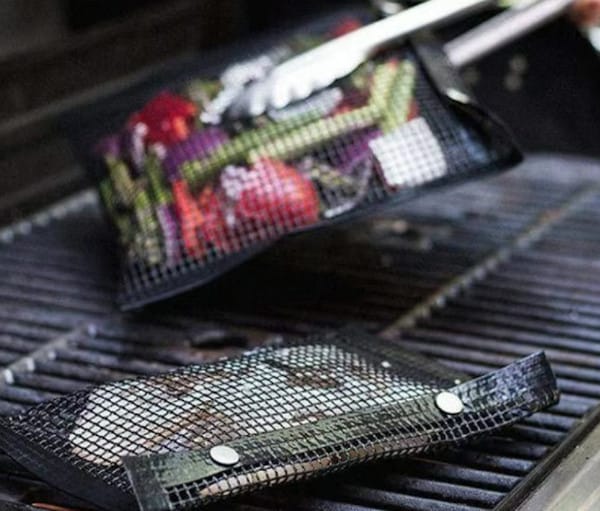
Grill bags are a convenient alternative for cooking on the grill with added benefits, such as infused smoky flavor and easy clean-up.
Grill bags, also known as BBQ bags or cooking bags, are a versatile and convenient option for grilling enthusiasts. They are made of heat-resistant materials like silicone, non-stick coatings, or aluminum foil and are designed to be used on the grill.
Grill bags help keep food moist while protecting it from the flames, making them ideal for delicate items such as vegetables and fish.
One important tip when using grill bags is to make sure the bag does not touch any direct flame or heat source as this can cause melting or burning of the bag material. It’s also essential to avoid overcrowding the bag by sticking too many items inside it as this may lead to uneven cooking results.
Using grill bags makes grilling foods much easier while also keeping your grill clean and preventing flare-ups caused by grease dripping onto hot coals or burners.
Oven Bags Vs Grill Bags
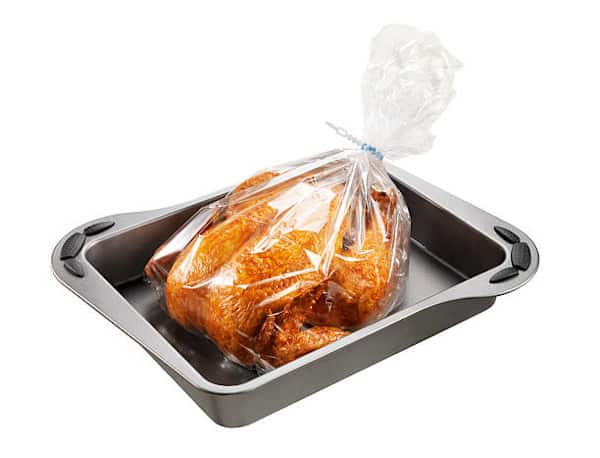
When it comes to cooking on the grill, some may wonder if oven bags can do the job. In this section, we’ll explore the differences between oven bags and grill bags, their pros and cons, and which one you should choose for your grilling needs.
Differences In Material And Design
One of the key differences between oven bags and grill bags lies in their material and design, which influences their function and suitability for different cooking methods. The following table outlines these differences in detail.
| Oven Bags | Grill Bags |
|---|---|
| Made from heat-resistant materials like polyester or nylon that can withstand high oven temperatures, typically up to 400°F. | Constructed from materials such as aluminum foil, which can withstand the direct heat and flames of a grill. |
| Designed to trap moisture and steam, helping to keep food tender and juicy during the cooking process. | Often feature perforations or vents that allow for better heat circulation and some release of steam, resulting in a grilled texture and flavor. |
| Most oven bags include a closure or tie to seal the bag and trap moisture inside. | Grill bags may have closures, but some are designed to be folded or sealed by folding the edges together, ensuring that food remains secure during grilling. |
By understanding the differences in material and design between oven bags and grill bags, you can choose the best option for your cooking needs and avoid potential safety hazards.
Pros And Cons Of Each
When considering whether to use oven bags or grill bags for your cooking needs, it’s important to weigh the pros and cons of each option. The table below outlines the advantages and disadvantages of both oven bags and grill bags to help you make an informed decision.
| Oven Bags | Grill Bags | |
|---|---|---|
| Pros | FDA-approved and free of harmful chemicals Helps retain moisture in the meat, preventing it from drying out Can be used in ovens and microwaves Often made of PET material with higher heat resistance | Designed specifically for grilling Nylon grill bags can withstand temperatures up to 220 degrees Celsius Helps protect food from direct flames and charring Keeps grill clean by containing grease and juices |
| Cons | May not be safe for use on the grill due to lower heat resistance Potential safety risks, such as melting or flare-ups, when used on the grill Can limit the development of grill marks and smoky flavor | May not be suited for oven or microwave use Limited to grilling applications Higher heat resistance may come at a higher cost |
By evaluating the pros and cons of oven bags and grill bags, you can choose the most suitable option for your specific cooking needs and preferences.
Which Is Better For Your Grilling Needs?
If you’re looking for an alternative to using traditional foil packets, both grill bags can be great options over oven bags for grilling. While oven bags are typically made of heat-resistant nylon or polyester and designed for cooking food in the oven, some brands do offer multipurpose bags that can also be used on the grill with special precautions.
Grill bags are specifically designed for use on a hot grill and often come in heat-sealed varieties that allow you to cook with liquid ingredients without fear of leakage.
Conclusion: Making The Right Choice For Your Grilling Experience
In conclusion, using cooking bags for grilling or oven-roasting can be a game-changer in the kitchen. Oven bags are versatile and easy to use for creating juicy meats and veggies while grill bags withstand high temperatures and infuse smoky flavors into your food.
However, it’s important to understand the risks associated with using oven bags on the grill and always prioritize safety. Whether you’re looking to cook a stuffed turkey or make an easy one-pan meal, there is a bag that will suit your needs perfectly.
With so many options available, the choice ultimately comes down to personal preference and cooking style.
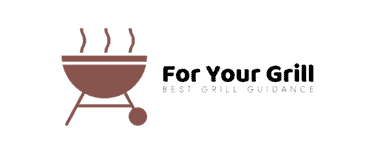
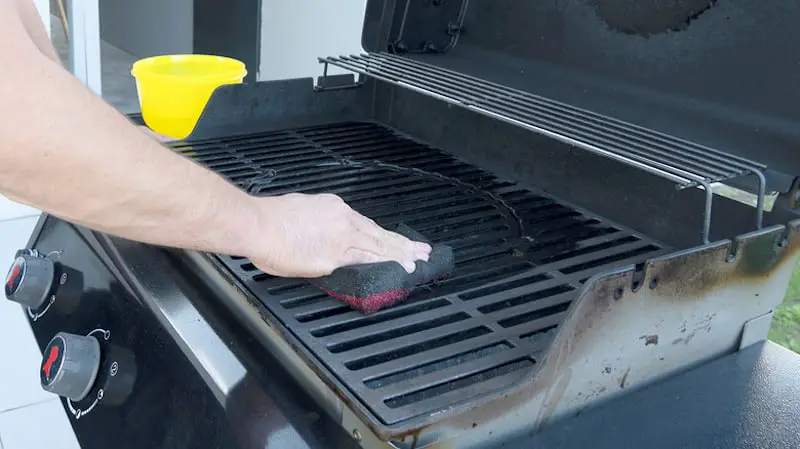
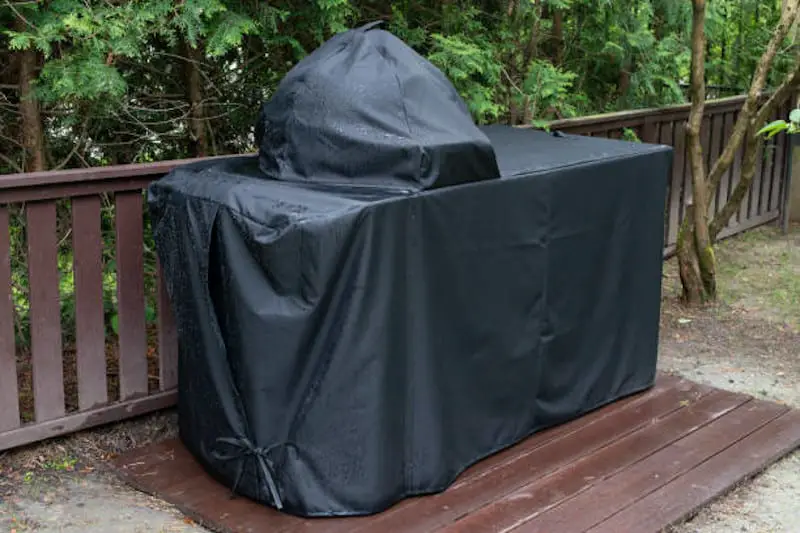


Leave a Reply